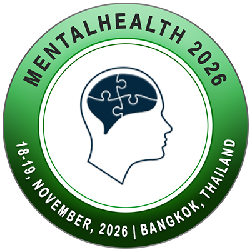Track: Post-Traumatic Stress Disorder

“Understanding and Managing Post-Traumatic Stress Disorder: From Diagnosis to Recovery”
This session will examine Post-Traumatic Stress Disorder (PTSD), a mental health condition triggered by experiencing or witnessing a traumatic event. Attendees will learn about the symptoms of PTSD, such as intrusive memories, flashbacks, avoidance behaviors, and heightened arousal. The session will cover the diagnostic criteria, risk factors, and the impact of PTSD on individuals' mental health and daily lives. Participants will explore various treatment options, including trauma-focused therapies like cognitive processing therapy (CPT) and prolonged exposure therapy, as well as pharmacological treatments. Emphasis will be placed on understanding trauma’s effects, effective intervention strategies, and providing support for individuals coping with PTSD.
Trauma and PTSD: Definitions and Mechanisms
This session will explore the concept of trauma and how it relates to the development of PTSD. Participants will learn about different types of traumatic events, the psychological mechanisms that contribute to PTSD, and the impact of trauma on the brain and behavior. The session will also cover the criteria for diagnosing PTSD and the common symptoms associated with the disorder.
Cognitive-Behavioral Approaches to PTSD
This session will focus on Cognitive-Behavioral Therapy (CBT) and its application in treating PTSD. Attendees will learn about techniques such as Cognitive Processing Therapy (CPT) and Prolonged Exposure Therapy (PE), including how these approaches help individuals process traumatic memories and modify maladaptive thoughts and behaviors. The session will highlight evidence supporting the effectiveness of CBT in managing PTSD.
EMDR Therapy for PTSD
This session will provide an overview of Eye Movement Desensitization and Reprocessing (EMDR) therapy, a specialized treatment for PTSD. Participants will learn about the phases of EMDR, the rationale behind eye movements, and how this therapy facilitates the processing of traumatic memories. The session will also discuss clinical considerations and outcomes associated with EMDR.
Pharmacological Management of PTSD
This session will cover pharmacological treatments for PTSD, including the use of selective serotonin reuptake inhibitors (SSRIs) and other medications. Attendees will review the indications, benefits, and side effects of various medications used to manage PTSD symptoms. The session will also discuss strategies for combining pharmacotherapy with psychotherapy for optimal treatment outcomes.
Avoiding Things
This session will focus on avoidance behaviors in PTSD, where individuals consciously or unconsciously avoid people, places, or activities that remind them of the traumatic event. Participants will explore how avoidance can hinder recovery, the psychological mechanisms behind it, and strategies for helping individuals confront and manage their avoidance behaviors in a therapeutic setting.
Having Negative Thoughts and Feelings
This session will address the pervasive negative thoughts and feelings experienced by individuals with PTSD, including self-blame, guilt, shame, and a distorted view of the world. Attendees will discuss cognitive-behavioral techniques to challenge and reframe these negative thoughts, as well as methods for fostering a more positive self-image and outlook.
Reliving or Re-Experiencing the Traumatic Event
This session will explore the phenomenon of reliving or re-experiencing the traumatic event through flashbacks, nightmares, or intrusive memories. Participants will learn about the impact of these experiences on daily functioning and well-being, and discuss therapeutic interventions such as exposure therapy to help individuals process and reduce the intensity of these intrusive experiences.
Being on Edge
This session will focus on the hyperarousal symptoms of PTSD, including being easily startled, feeling tense or "on edge," and having difficulty sleeping. Attendees will explore the physiological and psychological aspects of hyperarousal and discuss strategies such as mindfulness, relaxation techniques, and grounding exercises to help individuals manage these symptoms effectively.
Scientific Highlights
- Mental Health
- Women’s Mental Health
- Psychology and Psychiatry
- Autism
- Stress, Anxiety and Depression
- Psychotherapy and Counseling Psychology
- Behavioral Health and Bullying
- Suicide and Self Harm
- Bipolar Disorder
- Schizophrenia
- Neurology and Neurological Disorder
- Addiction
- Obesity and Eating Disorder
- Child and Adolescent Psychiatry
- Obsessive Compulsive disorder
- Post-Traumatic Stress Disorder
- Personality Disorder
- Child Abuse
- Legal and Ethical Issues in Clinical Research


